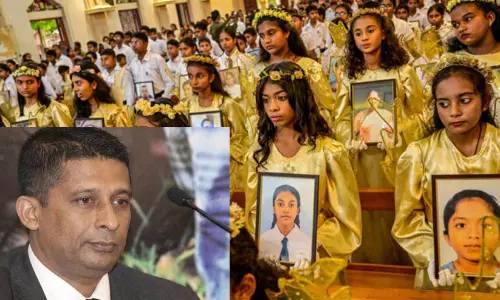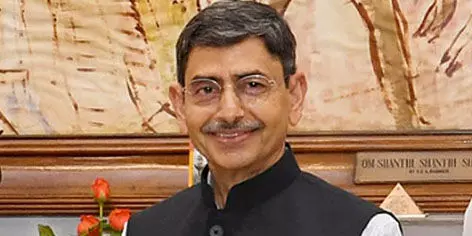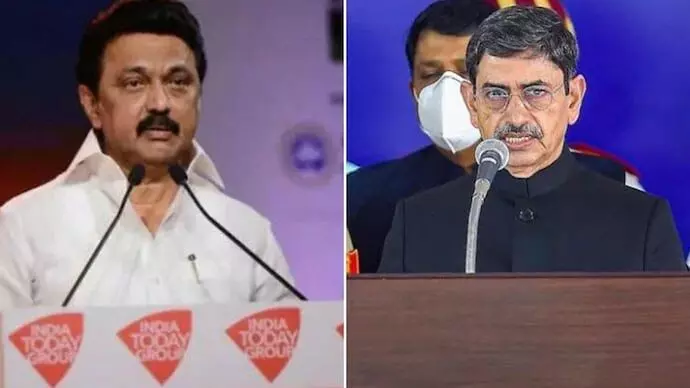
Federalism caught amidst Governor-Chief Minister tussle
text_fieldsTamil Nadu assembly in session
As the policies of the Narendra Modi government continue to undermine the Constitutional principles of democracy and secularism, it is natural to manifest itself in a challenge to federalism and attempts to subvert the autonomy of the states. The Sangh Parivar, uninhibited by any faith in pluralism or diversity, is running roughshod all over and trying to impose its Hindutva agenda on the country, flouting all democratic norms. Part of that is the planned program of making the governors a tool to snub the state governments duly elected by the people. Most recently, the Tamil Nadu Legislative Assembly witnessed the impulsive action of Governor Ravindra Narayana Ravi running counter to the spirit of federalism. Ravi read out the usual policy declaration speech at the beginning of the year in the assembly, but left out the parts he deemed unacceptable. The allies of the ruling DMK had already walked out protesting against the governor's move to change the official name of the state, Tamil Nadu, to 'Tamizhakam' to please the interest of the RSS. The Governor read the English translation of the policy announcement speech prepared in Tamil and omitted paragraph 65. The content of paragraph 65 starts with 'This government is based on social justice, self-respect, inclusive development, women's empowerment, secularism etc.' The Governor also dropped the sentence that starts with 'Tamil Nadu remains a haven of peace and...'.
However, when the full Tamil version of the speech was read by Speaker M. Appau, Chief Minister M.K. Stalin intervened and demanded that the full speech should be made part of the House records; and the demand was endorsed by the members. With this, Ravi left the House. The Tamil Nadu governor failed to show even the courtesy which Kerala Governor Arif Mohammad Khan had shown on 29 January 2020 when he read out the policy announcement of the Left Front government in the state. In that speech, Khan read out, though under compulsion, the statement that the Kerala Assembly had passed the Citizenship Amendment Act, at the same time expressing his disagreement with that resolution. The ruling DMK-led alliance of Tamil Nadu had demanded in a petition submitted to the President, that RN Ravi be removed from the post of governor citing that he had fanned communal hatred among the people. Of course the demand was not conceded because Ravi, who is also a former colleague of National Security Advisor Ajit Doval, is doing the bidding of the Centre as assigned to him. In almost all the states ruled by non-BJP parties, the fight between the governments elected by the people and the rulers hoisted on the Raj Bhavans continues fiercely. Earlier, when Jagdeep Dhankar was the Governor of West Bengal, he was in an open war with Chief Minister Mamata Banerjee on many issues. It was after he was elected Vice President that there has been a temporary reprieve in the clash.
In Kerala, as the clash between Arif Mohammad Khan and Pinarayi Vijayan's state government reached its climax, the assembly passed a bill to remove the governor from the post of chancellor of all universities and appoint other eminent persons as chancellors and sent it to the Raj Bhavan for his signature. Several days have passed since the bill was sent to him. Reports indicate that he was planning to send it to the President as per the rules without signing it. The President can put it in cold storage indefinitely. Until then, the appointment of VCs of the said universities will also remain uncertain. Although the cold war between the Governor and the Chief Minister is supposed to have eased, the Left Front government cannot hope to move forward without compromising its fundamental positions and without diluting its policies as long as someone totally subservient to the whims of the Central Government reigns in the Raj Bhavan with the full cooperation of the saffron army. In fact, the framers of the Constitution envisioned that the governors should serve as a bridge between the Centre and the states. This was underlined also by the Sarkaria Commission, which studied the Centre-State relations. But the current conundrum is likely only to intensify in the coming days when those who do not accept unity in diversity as a beautiful, peaceful and strong national concept in India, which globally has a unique identity with diverse castes, languages and religions, keep speaking only the language of power.


























